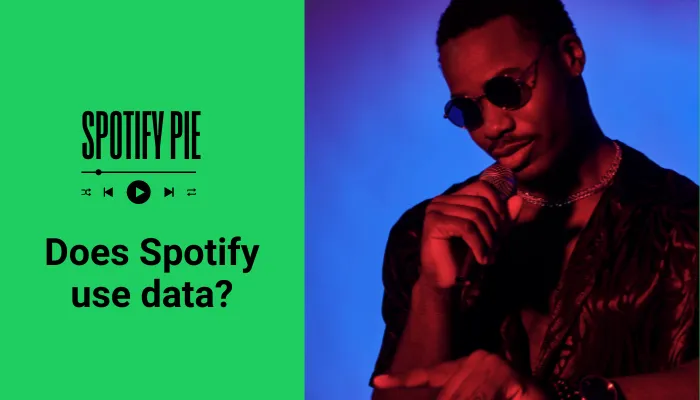Music consumption has changed forever thanks to Spotify. “Does Spotify Use Data?” No more heavy MP3 players and full CD cabinets. All you need is a phone that can be tapped and millions of songs, artists, and playlists are at your disposal.
It is this extreme popularity that comes from its engine which is highly propelled by data of a sophisticated nature for personalizing users’ experiences thus; ensuring they keep on coming back for more.
However, have you ever taken a moment to think about how much data Spotify collects and Does Spotify Use Data? This article delves deep into the world of Spotify’s data usage.

Understanding Spotify’s Data Collection
Spotify obtains user’s information in two ways:
- Passive Data Collection: This happens when you are using the app in the background telling what songs were played, for how long they were listened to, or even devices used to access Spotify.
- Active Data Collection: For instance, creating playlists, following an artist, or searching for particular songs among others are examples of these methods whereby users provide details directly.
Types of Data Collected by Spotify
Usually, three categories can be used to describe the types of data that this company gathers:
| User-Provided Data: The name given refers to information keyed in within the app like names entered on “Sign up”, addresses entered during the registration process plus preferences made concerning listening. Behavioral Data: This entails activities done on an app like listening to certain songs & frequency with which one listens to music, creating of playlist by someone, or following favorite artists. Device Information: Such as the operating system installed in a phone or tablet and, the make and model of the device used to access Spotify servers including its IP address.the |
Privacy Policies and User Consent
Like most online platforms, Spotify has a privacy policy that explains to users what data is collected from them and how it is used. Therefore, before allowing the app to access your information, it is essential to go through this guideline.
However, there are other details that must be supplied because they are necessary for the app’s proper operation.
How Spotify Uses Data?
Spotify gathers data for various purposes—some more obvious than others:
- Personalization of Music Recommendations: Based on your listening history, Spotify can suggest songs you might like or artists you might enjoy. This is why you get playlists like “Discover Weekly” or “Release Radar” as per your individual preferences.
- Targeted Advertising: Your music tastes determine what ads you see; hence the use of data to show you adverts that are relevantly placed. In other words, Spotify still manages to make some money even if it means keeping ads relevant to user experience.
- Content Curation and Playlist Recommendations: Using behavioral analysis plus current trends in the music industry enables Spotify to generate lists designed for particular genres moods or events.
- Improving User Experience and App Functionality: By collecting different types of data from users’ devices when they’re logged in, Spotify identifies ways it can enhance its service delivery.
Concerns and Criticisms
Nevertheless, these practices have sparked many concerns about personalized services offered by the company:
Data Privacy Issues: There are serious concerns about the vast amounts of data Spotify gathers for possible improper use. Data breaches or unauthorized access to personal information are constantly at risk.
Lack of Transparency in Data Usage: Although there is a privacy policy in place, it may be hard for users to tell how exactly their data is utilized and given out to other people.
Ethical Considerations Surrounding Data-Driven Practices: This can lead to issues such as filter bubbles where users are only exposed to songs that confirm their existing preferences due to undue reliance on data algorithms.
Finding the Balance
More personalized and enjoyable music experiences can be achieved by the information collected by Spotify. However, it is important to appreciate its potential negative side effects and know how your data is being used. Below are some ways you can manage your Spotify data:
- Review Spotify’s Privacy Policy: Understand what information is being collected and its purpose.
- Adjust Data Sharing Settings: Reduce the amount of information Spotify gets from you. Go through the app’s settings for available options.
- Consider Disabling Targeted Advertising: If you find personalized adverts not good, opt-out from the app settings by not agreeing with targeted advertising.
In the end, however, it comes down to you. You can create a personalized listening experience while ensuring that your music stays delightful and private by understanding how Spotify uses your data and adjusting your own privacy settings accordingly.
How Spotify Uses Information to Power Your Listening Experience?
For music fans, Spotify has become indispensable. It’s a digital jukebox on which one can find just about every song ever recorded and more than 10 million others as well as curated playlists. But how does it work? The answer is in the data.
Like many other platforms, Spotify uses user data to make a better listening experience for you while also supporting artists and driving innovation within the music industry. However, this collection comes with responsibilities of privacy and legal compliance.
Rather, let’s get into Spotify’s data usage arena and explore its advantages, user controls, and the surrounding legal environment.
Champs Elysees Of Spotify Songs Enhancement
Spotify’s use of data goes beyond counting how many times you’ve listened to a song. Some ways they do this are:
- Personalized Recommendations: Forget scrolling through general playlists forever! By analyzing your listening routines like what artists you listen to, genres you prefer, or even the time of day when you usually stream music, Spotify can come up with playlists that are specifically designed for your tastes. Discover Weekly features alongside personalized radio stations plus daily mixes all help in discovering new music that one is likely to enjoy.
- Enhanced User Experience: Through utilizing data, Spotify can predict what you’ll want before you do so yourself. For instance, if it knows that your home commute features heavy listening time it can pre-download your favorite lists allowing offline play ease across Wi-Fi –> Cellular transition phases.
Besides using such data to improve search results by suggesting relevant albums or artists based on previous searches. - Understanding Your Listening Habits: At year-end, Spotify provides insights into your listening habits through “Spotify Wrapped.” This interactive feature discloses things like who your top artists were or the total number of minutes spent streaming on any device during a calendar year. It is a nice way to recap your musical journey and possibly identify trends in listening patterns.
User Control and Privacy
When it comes to data collection, transparency and user control are key. Some ways Spotify enables you to manage your data and privacy options include:
Data Overview: Listening history, created playlists, or saved songs can be obtained as part of a breakdown of the data that Spotify collects from you.
Privacy Settings: These settings allow you to control whether Spotify personalizes your ads, tracks your listening activity for targeted recommendations, and shares your data with third-party partners.
Opt-Out Options: However, users have an option not to provide their information for features like personalized recommendations. Yet this might hamper the overall user experience.
Understanding these options allows individuals to make informed decisions regarding their personalization preferences on Spotify as well as their own data rights in general.
Navigating Data Regulations
Spotify operates within a legal framework that governs what kind of user information may be collected, stored, or used. Here are some key points:
- Compliance with Data Protection Laws: Spotify follows various data protection laws across the world including the General Data Protection Regulation (GDPR) in Europe, which makes such regulations necessary as transparency about data collection, user consent, and the right to access and delete personal information.
- The Impact of GDPR: The way Spotify manages user data has been significantly affected by the GDPR within Europe. For this reason, it requires explicit consent when collecting data from users and allows them to request for deletion of their personal details through “the right to be forgotten”.
- Keeping Up: The regulatory terrain in relation to the privacy of data is always changing. Such changes must be tracked by Spotify for compliance purposes as well as retaining customers’ confidence.
Spotify endeavors to adhere to these legal guidelines that will help in maintaining responsible approaches towards its data usage and user trust based on this.
Conclusion
In conclusion, “Does Spotify Use Data?” Spotify experience is largely shaped by the use of data that impact both users and artists. This enables personalized recommendations, a more intuitive interface, and valuable metrics for the music industry.
Nevertheless, trust plus transparency relies much on how much control users have over what happens with their own information respecting all rules connected with protecting this kind of content’s integrity.
As technology changes, Spotify needs to modify its utilization practices so that there will not be conflicts between innovation processes, customer journey maps, or privacy priorities. In the end, it’s all about making good use of collected knowledge while keeping it private enough not to harm any party involved in these processes.”
